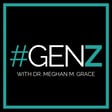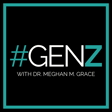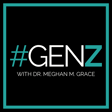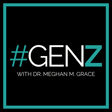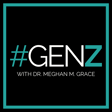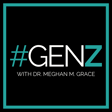Become a Creator today!Start creating today - Share your story with the world!
Start for free
00:00:00
00:00:01

Managing Gen Z Early Career Talent
Are you struggling to retain your interns and early career employees? This episode features a conversation with Parker Pell, co-founder of Abode HR. Parker shares practical tips on how to effectively manage Gen Z talent and create a workplace that fosters loyalty and long-term engagement. Discover strategies to attract top talent, provide meaningful development opportunities, and build a positive company culture that resonates with Generation Z.
Learn more about Abode HR and connect with Parker on LinkedIn.
Recommended
Transcript
Introduction to Gen Z Podcast
00:00:13
Speaker
Welcome, this is hashtag Gen Z, a podcast that explores generation Z, who they are, how they're different from other generations, while also being an incredible blend of those who came before them. We explore what they think is cool, what moves them, and why they do what they do. I'm your host, Megan Grace, and it's so nice to have you here.
Role of Internships in Career Development
00:00:30
Speaker
As we continue to explore Gen Z in the workplace, let's take a stop to focus on an important developmental phase in careers, internships and early career roles. so Whether it's an internship or a first job after graduation, the early career phase is critical to help people plan and navigate their time in the workforce. For those who have positive experiences, it can be a jumping off point into bigger roles or opportunities. For those who have negative experiences, it can sour them to and a company or even an entire industry. Either way, the early career days are a profound learning environment, and companies and leaders should be paying attention to this phase of the professional journey.
00:01:10
Speaker
In a recent intern poll study, KPMG found that one in three Gen Z interns plans to stay with their first employer in their first job for five years, which bucks the preconceived notion that younger generations are not loyal to their employers. Like most other generations, it seems like Gen Z is willing to be loyal if the working environment aligns with what they're looking for.
00:01:33
Speaker
Luckily, our guest today is here to tell us more about how companies and organizations can better manage career talent and keep them engaged.
Who is Parker Pell?
00:01:41
Speaker
In this episode, I'm joined by Parker Pell, the co-founder of Abode. Parker has a background in campus recruiting and understanding Gen Z through research and presentations. He focuses on bridging the gap between the next generation being recruited and employers by bringing talent through his work in candidate engagement, program management, and conversion best practices.
00:02:07
Speaker
I'm excited for this episode. I'm excited for every episode. As you know, um anytime I get to make new friends and talk about one of my favorite topics, it's a good day. And that is certainly what we're going to be doing today. I'm excited to welcome Parker Pell to the conversation. Parker, welcome. Thanks, Megan. I appreciate you having me on. Well, Parker, tell us a little bit more about who you are. Give us a bit about your story. Who are you? What's your role? And and more, I think we're interested in the journey that you took to to the role that you're working in right now.
Parker's Journey and Founding Abode
00:02:34
Speaker
Yeah, so my story, currently I'm a co-founder of the company called Abode, which we'll dive into a bit later, but I'm based out of Montgomery, Alabama, um me and my wife and our dog Nala, who we love very dearly. um And funny enough, I was at one point in time an intern for a couple of companies who had an experience that didn't really meet up to my expectations, I'll say.
00:03:02
Speaker
And come to find out a lot of my friends had these similar experiences. And that was the intuition for me and my roommates to start our company about. I'm super passionate about Gen Z. I am the oldest Gen Z. So literally the oldest like laugh, like the last year that you can be Gen Z, that is me. um And I take a lot of pride in trying to ensure and and understand kind of what our generation
00:03:35
Speaker
the generation that's gonna make up 30% of the workforce by 2030 is really invested in and cares about when they're looking at their first career. So I spend a whole lot of time talking to fellow Gen Z individuals about their career paths, internships, job search, you name it, anything. I've probably had a conversation around around that and obviously have led us to to the conversation today.
00:04:05
Speaker
So that's a bit about myself, ah my story and and just kind of where my passions lie. I think it's so great that you and your roommates have taken what I don't want to say were negative experiences, but maybe less than ideal experiences because so many people would take a less than ideal experience, whether it's an internship or a job or just anything and said that wasn't ideal and I'm not going to do anything to improve it. And I think that's really cool that you all are taking the energy from less than ideal situations and hopefully creating better situations for people that come after you, which gives really a good launching off point into, let's talk about a bode.
What is Abode?
00:04:40
Speaker
What is your passion? your Your baby, if you will, right now. um What is the company? How did it come to be? And I know that you all have a focus on early career early career talent and why that group specifically.
00:04:52
Speaker
Yeah, so I'll give a quick introduction to abode, but I think our story is kind of really sheds light into kind of the company as a whole and and why the company does what we do today. So abode is a Software Platform, a B2B company where we support early career talent programs to meet the expectations of Gen Z in their internship experience. So what does that entail, right? And Megan, I don't know, were you an intern at one point in time in your college career? I was. I was. I did. I interned with the Cystic Fibrosis Foundation of Orange County. I always like to shout them out because they do great work.
00:05:33
Speaker
Okay, awesome. So myself included, right, but you know, campus recruiting, you get to school, you're all excited to see your friends and then career fairs come up and you're like, Oh gosh, I need to go and like get a job or an internship. um And so we, this goes into our founding story.
Challenges Interns Face Before Starting Work
00:05:52
Speaker
Me and my two other co-founders, we did the traditional campus recruiting route, attending career fairs, getting job offers, signing that job offer, that first internship that I still remember with Atmos Energy down in Dallas, Texas um in 2017. We signed that internship offer, and you're so excited. and You tell your parents, your friends, everything, like, I've got a job this next summer.
00:06:15
Speaker
And then it you go back to school and you're kind of waiting, right? There's this gap between when you sign that offer as an intern and when you can actually start at that employer, which is not traditional in like traditional hiring experiences where you might have two weeks between signing an offer and starting.
00:06:34
Speaker
um And during that time period, right there's a lot of anxiety that can build up of, have I done everything I need to do for this upcoming job? Who in the world am I going to be working with at this internship? Some interns are relocating the cities they've never lived in. Where in the world should I live in? right And a lot of questions that come up during this during this time.
00:06:57
Speaker
um And companies today, if they're not using a boat, will send emails. Megan, I don't know about you, but email when I was in college, I didn't really use email. like I didn't know the importance of of like using email in college. um And so a lot of communications that I was getting sent for my employer were going to my spam email. I had no idea. right like I just thought like it was ah I just wasn't hearing from them.
00:07:27
Speaker
and so That was kind of the intuition of shared experiences between the three of our co-founders at abode is kind of during this gap after I sign it off from before I start as an early in career individual, like could there be a way for a company that connect me with my fellow interns or my fellow like program participants, right? Share with me information as often as I wanted it to um in a better way that was more seamless. um And so,
Abode's Mission and Solutions
00:07:56
Speaker
We took that entrepreneurial spirit, I'll say, and we graduated from college in 2019 and launched kind of the first version of a boat, which really was ah a consulting firm where we helped campus.
00:08:13
Speaker
recruiting teams to really ensure that their messaging was ah resonating with the generation of Gen Z being recruited because that's what we knew we were 21, 22 at the time. um And in that process over two years learned that companies did care about the candidate experience for their interns after they signed those offers, um but didn't have a good way to ensure that they were meeting those expectations of Gen Z in a way that was able to be done by the company themselves.
00:08:48
Speaker
And so now you have a boat where companies are able to ensure that there's consistent communication and engagement, a place for mentorship and connection, all of the things right that when you sign that first internship offer, you're really looking for. That's going to leave you with a lasting impression of like what a career that company could be.
00:09:07
Speaker
we have all of that and in really kind of a one-stop shop approach. um And I think the focus on early talent management is just because it was a shared experience. Like we were early talent not too long ago, right? And so we feel like we can really have an impactful voice and an influence on the companies that we work with and the experiences that they're delivering and what that will do for their interns, right, for their interns careers and experience with that employer ah overall. So that's a lot. That's, I think, no, that's, that's wonderful. I think that it's great. that I think a lot of people get this early career
00:09:49
Speaker
or early talent phase wrong. um Not that like i' be like companies are doing everything wrong, um but the mindset around it of, yes, they might not be there for a long time, but they could be there for a time that is pivotal for them to become ambassadors for that organization or not. right A good internship and a bad internship can be make or break on if a person even wants to buy consumer products from that organization again.
00:10:13
Speaker
recommend a friend to go work there or potentially boomerang back um to that organization. And so I've always been able to like, I've been able to work with some really amazing interns and some of them I'm like, I wish I could keep you on forever, right? Like we just don't have the role right now. um And I wish that more people are taking the approach at ULR of helping realize that like that intern group is not just like, get your college credits or whatever you need for school and get out of here.
00:10:37
Speaker
and there It is so important and and such an important i think phase of life for the interns or the the early talent professionals as well. I think you could even apply that to first jobs that many people have had. um i my first job like My first big kid job was one of the most important launching points of my career and I just didn't know it at the time. um But I love that what you all are doing, because you know what I heard is that there's some things that are going to transcend generations around like an internship or a new job in your early days and that's yeah how to start the job, who to talk to, what mentorship, what connections do I need and some of the basic logistics stuff of like ah probably filling out forms um but also how to navigate like if you have to make a move for a job like that can create a lot of stress and I think in past generations it's just been like
00:11:25
Speaker
You don't know what you don't know until you learn it on your own. And that dissonance can be really frustrating, but we don't need to suffer. right like We don't need people to suffer through that dissonance. And so I'm excited to continue to learn more about how you all are solving that problem. But I do know that um abode recently did some research on Gen Z.
Gen Z Workplace Preferences
00:11:42
Speaker
I'm sure you're always kind of researching Gen Z as youre one of your target end users. What are some of the findings that from that research that you think people need to be paying attention to about Gen Z?
00:11:52
Speaker
Yeah, I love this question, by the way, because it really influences the work that our team does every single day and how we advocate to our partners, kind of how they are delivering an internship experience that's really meeting that Gen Z's expectation, right? um There are a few key, we like to call them tenants to,
00:12:20
Speaker
Gen Z that we like to discuss transparency, respect, and connection. So we can break those three down pretty seamlessly and translate them to write o how companies should be catering and evolving what their processes are to this generation, right? So transparency, yeah we all know what it means to be transparent, but That transparency doesn't stop at that first interview that ah you have with a recruiter, right? That transparency Gen Z is looking for that to transcend into their mentor, their buddy, their hiring manager.
00:13:03
Speaker
the description of a event when they're working for you that tells them if it's mandatory or optional. All of these different workings of experiences an intern has or an early career professional has when they join an organization.
00:13:20
Speaker
wanting that transparency to be upfront and center, right? Nothing hidden, nothing assumed that they know, right? Take that assumption, put it to the side, and then be overly communicative with expectations, right? Respect. I think that there is a stigma sometimes around who Gen Z is and like that they don't think that there needs to be professional etiquette and they want to work whenever, wherever they want. And I think
00:13:55
Speaker
We like to think of respect as respecting differences in generations and being open-minded to those thought processes. But at the same time, there's ah it's respect is a two-way street. And so being able to set that foundation for the relationship in the workplace to go as long as possible and go for as long as as the company wants.
00:14:21
Speaker
um For example, if you're working a job in a industry where traditionally you're expected to wear a suit and tie, whatever that industry might be, right? You probably aren't going to be able to walk into that industry and just wear shorts and like a t-shirt.
00:14:38
Speaker
But you can understand in the company can let you know, hey, here's when it is acceptable to be more casual versus when you do need to be formal. One example that I've heard recently um that that goes into to that. And then last one is connection. So connection.
00:14:54
Speaker
in Megan, I'm sure like when you are going and you sign that offer for your first job, the first thing that pops near my head is like, I wonder if anyone else in my school is going to work at this company, right? Like maybe, especially if you're at a big school, you never know. So that connection with one another, right? Obviously, I want to know my manager who I'm working for right but at the same time like that connection with each other is what is going to really drive innovation growth and
00:15:25
Speaker
ah a better career overall at the at the company. um And so connection in that, how can a company foster community based on ideas, based on locations, whatever that connection and community, however it works best, um taking that into account in all of the processes of this kind of early in career professionals experience with that organization. um And then lastly, what i like to I'd love to talk about is just kind of like,
00:15:57
Speaker
work-life balance. And when I say work-life balance, I like to think about in what we see in Gen Z is this work-life balance guy thinks about it from like an autonomy standpoint. It's not that, hey, I don't want to work 40 hours a week. It's, hey, can I have the autonomy to be able to communicate? Here's when I'm going to work. And here's here's when I work best versus here's when I don't work my best. And I learned that about myself. Can I communicate that and have that autonomy to have that conversation in transparency with my hiring manager.
00:16:31
Speaker
and return, get respect in ah an answer of like, hey, this will work, this won't work, you know, from there. So that's a couple of the kind of key things I think that that we like to to think about in our research shows us in this really kind of opinions that we like to also communicate with our partners as well, right? Who are the companies that are influencing Gen Z and and bringing in all this these great interns into their organizations.
00:17:00
Speaker
I think that anytime you can break something down into three things, people remember it, right? So I think that that's something that ah many people can hear and understand and that does, ah it transcends different industries as well, right? So it's not like the people in the medical industry versus says let's just say facilities um aren't gonna look at that and say, yeah, those are kind of some things that young people, regardless of the type of work they're doing are probably gonna want from that, um from the working environment.
00:17:29
Speaker
Now, let's say that you had the the ears of HR professionals, um which I know that you do in your work, but we I know we've got some that might be listening, or at least people that can influence ah HR policies or the working environments of others. What advice would you have for those professionals when it comes to better engaging Gen Z and that early career talent group?
Engaging Gen Z: Tips for HR
00:17:52
Speaker
I'll go the three things again that I wrote down before that I think will really kind of are tenants that we advocate for. One is ah leveraging technology and all the aspects of your of the work that these individuals are going to be doing.
00:18:08
Speaker
from the time that they meet someone from your company at a pretend and describe ah discuss potential opportunity until the day they are 10 to 15 years into your into your organization and into their career, how can you leverage technology and enable Gen Z with technology to learn, grow, and develop? right So I think one is leveraging technology in every facet it possible because of who Gen Z is and Megan. i mean I grew up with an iPhone 4 since I was 12. I've always used technology to to help me um in my day-to-day. So one I would say is leveraging technology as as much as possible. um Secondly is really focusing on
00:18:55
Speaker
life outside of your work. So obviously it's focusing and talking about all of the work that you can do at that organization. But how does the company foster a culture of being able to do your hobbies, get involved in a community? What are the ways that the company is really kind of empowering their employees to be involved in their communities and kind of have a life outside of their professional life that they can get engaged with, right? um This can be as simple as providing, obviously, like hours for volunteerism, which I think is an awesome one that we hear is a super big draw for a lot of Gen Z when they're evaluating internship opportunities.
00:19:41
Speaker
um And then the third one I would say is just personalizing as many components of the experience as possible. If you get a blanket email that looks like there was some logic in there that says, hi, Parker, comma, dash.
00:20:00
Speaker
that doesn't show me that it was something that was shared directly to me. Personalizing communication as much as you can to Gen Z in a way that obviously is scalable for your team will only go the farthest way possible, because if we know one thing about this generation,
00:20:20
Speaker
They talked to one another, and they talked about the experiences they loved. They talked about the experiences they didn't love. um So any way that you can personalize any component of that candidate experience will only go farther for your brand. Wonderful. Now let's look at it on its head because there's there's plenty, I'm sure there's plenty of work that organizations can
Advice for Gen Z Job Seekers
00:20:41
Speaker
do.
00:20:41
Speaker
um to better engage Gen Z and many are just starting to scratch the surface um as more and more Gen Z are entering the workforce and um especially moving beyond that early career talent space. But there's still plenty of members of Gen Z that are taking those first steps in their career.
00:20:57
Speaker
And I would love to hear from you any advice that you would have for those um early career seekers, job seekers, or potentially those that are looking at their first internships um and helping them navigate those those first steps um in their their job search and career.
00:21:15
Speaker
I would say one is try to intentionally network as much as you can. So what I mean by that is, is the school that you're going to have an alumni network where you can find a and reach out to a potential mentor. So network intentionally in the city that you're in, are there groups or associations of an industry that you're interested in that you could join or maybe that your school is a part of, right? That you could go in and join. So networking intentionally would be a really big one.
00:21:46
Speaker
for for me i think another one that that i like to reference is trying to be as proactive as possible and building different skills so even if you are a specific major you think you have your career path fully set.
00:22:01
Speaker
Are there ways that you could develop skills that might not be as common in that specific career track that you think that you want to go into, but showcase a a brevity of um interest in a lot of different topics? ah So proactively trying to build skills. I mean, right now, hot topic, like could you take a three-hour course on Gen AI and how to leverage that in the workplace? And think about what that could do for you and going into an interview, if someone says like, talk about one thing that you recently did that really impacted you. Just one example, right? Kind of building and proactively building skills as as much as possible. um And then three, I would say, listen,
00:22:48
Speaker
I myself am still working on my listening skills, right? I think that listening, taking a step back to listen is something that I always like to advocate because I do think the generation of Gen Z is one of the more outward and vocal having social media, right? Everything that you think you put out there, taking a step back and listening for whatever that you're doing is another key piece that I would say is only going to help you in whatever it is, your in career search, your school, you name it. That's great. I think that there's, um, I think there's a lot of pressure, like an, uh, I don't know where the pressure comes from for interns and for those early career professionals that they have to know everything. Um, and I think, well, if I can toss one in there is like, uh, it's okay to ask for help.
00:23:44
Speaker
Like it is absolutely okay to ask for help. And um even if you're a decade or two decades into your career, people ask for help. um And there's no better time to ask for help and mentorship than in those early days of um early days of a career. And so I think what you've shared ah is such important, ah such important steps that people can take, right? I love the the idea of being intentional with networking. I think networking sometimes gets like a negative connotation of being smarmy or salesy when um it's amazing the community of people that you can build if you're just intentional about it um or you're not seeking a transaction out of it. I've found that I've met people along the way that I met one time, didn't talk to them for three years. We didn't have any form of transaction and they come back around one day and they're like, Hey, I was thinking about you and this might be a good opportunity for you.
00:24:35
Speaker
um And so I think that intentional and authentic networking can be so powerful. um Well, Parker, this has been just really in enlightening, right? I think that oftentimes the internship is dreaded, it's overlooked, it is seen as just like a necessary stop along the way, and a lot of people might see it as pointless. And I'm glad that you all are doing some work to ah counteract that narrative around what the internship is and what it could be, right? Like there's such a great opportunity there.
00:25:06
Speaker
um Now I wrap up every episode with a question that I think is so important um and you are a member of this generation. So you'll be able to speak very ah you know very close to the heart about
Gen Z's Impact and Influence
00:25:19
Speaker
this one. But what is one of your favorite things about Gen Z and some of your Gen Z peers? I think one of my favorite things about Gen Z is this generation's ability to influence.
00:25:36
Speaker
I think that there are a lot of conversations about Gen Z and what they can bring to the workforce, but I also think with that comes a lot of interesting opportunity for influence in changing the ways that the old guard has done things for as long as possible. um And I think that that opportunity to influence is something that this generation
00:26:13
Speaker
will take advantage of, and I think it will only go farther in growing every aspect of of life, work life, personal life, you name it. So I'd say that's my that's my favorite thing about about Gen Z.
00:26:30
Speaker
I can agree with you. I do think that they have an an ability to um have a lot of passion for something and then find other people that also have a similar passion to create movements. I think it is ah something that's truly fascinating with this with this generation. um And I think that it'll be interesting to see how that energy um translates into the career space and evolving the workplace. I know that there's already ways in which they're starting to do that, and it'll be ah quite interesting when there's a greater majority of them within the the workplace. ah Well, Parker, this has been so interesting and so helpful to learn with you. um I know that people will probably want to continue to follow along with the work that you're doing and the work that a boat is doing. What are the best ways that people can follow along with you and the company?
00:27:19
Speaker
Yeah, so ah for the company, it's abode, H-R-R dot com, A-B-O-D-E, H-R dot com. And reach out to me on LinkedIn, Parker Pell. I'm on LinkedIn quite often. So connect with me, reach out. I'm always happy to have a conversation with anyone. Wonderful. Parker, it's been great to have you here. Thank you again. Thanks, Megan.
00:27:46
Speaker
Another thank you to Parker. What a great way to take a less than ideal experience and channel it into creating better experiences for others. There are so many ways an internship or a first job can be a pivotal launching point for someone's career. Parker shared a few things companies who are looking to offer empowering internships and early career experiences can focus on. First, leverage technology to its fullest. It keeps people informed and connected.
00:28:11
Speaker
Next, acknowledge and foster life outside of work. Be sure to empower employees to have a life outside of the professional work that they do. And finally, personalize as many components of the internship or early career phase as possible. This could include communication or scaling experiences that align with personal interests. Parker also shared some great insights for Gen ZUs who are navigating those early career stages of their jobs.
00:28:37
Speaker
First, intentionally network. This could possibly be through your university, alumni group, or city group. This can be a great way to build connections with people who have similar career interests. Also, be proactive as possible at building different skills. It's okay to learn and explore things that might not be directly related to the work that you're doing right now, but it could broaden your career track down the road. And listen and take a step back as an opportunity to learn. This is a great skill not only for the workplace, but in life outside of work.
00:29:07
Speaker
To follow along more with Parker's work, you can connect with him on LinkedIn, and you can learn more about Abode at abodehr.com. That's A-B-O-D-E-H-R dot com.
00:29:19
Speaker
And thank you for tuning into this episode. It's always a great day when we get to hang out like this. If you enjoyed this episode, please be sure to rate, review, and subscribe wherever you listen to podcasts. Subscribing is the best way to make sure you don't miss new episodes when they become available. And speaking of new episodes, if you have a suggestion for a topic or a guest I need to talk to, I now have a pitch form on my website. You can find it at meganmgrace dot.com slash podcast.
00:29:43
Speaker
This episode was edited by Leah Kramer, the Gen Zer behind the scenes bringing this podcast to life. Shout out to Leah. We couldn't do it without you. Thank you again for stopping by. Let's continue this conversation and we'll chat soon.
